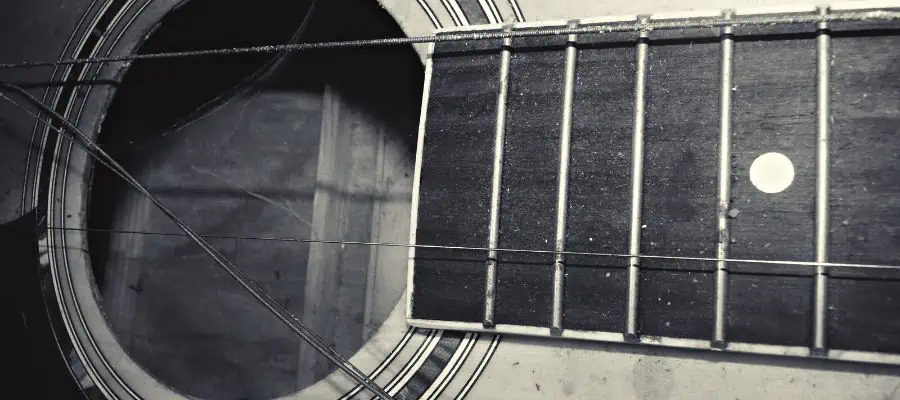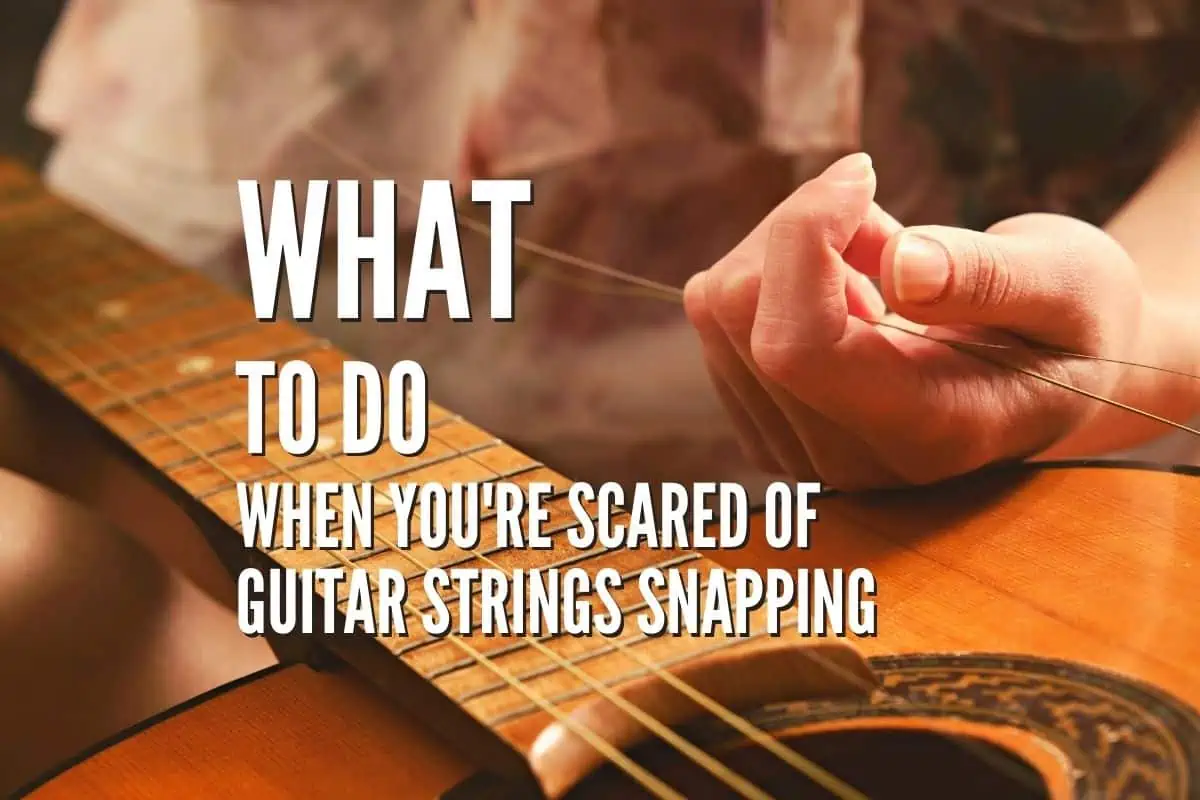Whether you are just starting to strum your first chords or a seasoned guitarist, a common fear lingers around the guitar world – the fear of snapping guitar strings. The snapping string phobia paralyzes many guitarists, preventing them from fully enjoying their musical journey.
Before the physical part, overcoming the fear of snapping strings is a psychological challenge. You should know that the risk of any injury and the string hitting your face is minimal. But, still, there are precautions to take.
Do not close your eyes during the restringing process, and wear goggles if necessary. Use a tuner to avoid going too high, get extra strings to be prepared, and use a string winder. One final trick you can do is reward yourself anytime a string breaks to associate the experience with an enjoyable memory.
A quick Google search shows tens of blog posts about anxiety about guitar strings breaking and snapping. But, as with any phobia, the human brain can find many ways to eliminate this constant discomfort.
Can A Broken Guitar String Hurt You?

Before getting into the psychological part of the topic, let’s find the answer to the most fundamental question. A broken guitar string does can hurt you, but it is crucial to understand that the risk of injury is extremely low. A small cut, a mild sting, or a light bruise is what you can expect.
That being said, with proper techniques and precautions, these injuries can easily be avoided. So, there is little to worry about in the rational part of things!
How to Play Guitar Without Worrying About String Breakage?

To fully enjoy playing guitar, you must free your mind from these worrying issues. So, you should deal with your snapping string phobia. Luckily, there are many ways to do so. Taking good precautions like having a good setup, stringing well, using good-quality strings, and changing them regularly are some of the most important precautions you can take.
One of the most common reasons for strings snapping is age. So, not changing the string for long and playing with old, oxidized, or worn strings will definitely lead to snapping at some point.
Another common reason is a rough surface touching the strings, like a tunning machine with a burr that rubs against the strings or a saddle with an extra sharp point. In this case, your string will always break from the same spot. If you experience that, you can take your guitar to your tech for a proper setup.
Also, strings sometimes come faulty from the factory. Although it is rare, some strings are prone to breaking by default. If you want to be extra precautious, tune your strings slowly when tuning them higher.
As mentioned, the injury risk from snapping strings is extremely low, and as a guitarist, you will often experience snapping strings. After each time you will be more relaxed about it as you will see it has almost no risk!
Tips to Overcome the Fear of Snapping Strings

- Don’t worry, it won’t hit your face: Most new guitarists fear the snapping strings hitting their faces. But you can relax! If you do not change your string, putting your face to the soundhole or playing guitar that way, there is no chance of a broken string hitting your face. When a string is broken, the tail snaps outwards, perpendicular to the guitar’s top, not to the direction of your face.
- Don’t close your eyes when tuning your string: Having your eyes open when changing and tuning the strings is important as you can be aware of the string tension and your posture and react if you are doing anything wrong.
- Wear plastic goggles if nothing works: If your fear persists, or if it is your first time changing strings, you can wear goggles to feel more relaxed. There is nothing wrong with being extra precautious. But, after a few times, you will see it is unnecessary.
- Always use a tuner so as not to go too high: The main reason a string breaks while tuning is increasing the string tension too much or too fast. So, try to tune your strings slowly and use a tuner so as not to go too high and increase the string tension too much.
- Always have extra strings: Always having a backup plan is like having insurance. So, carry extra strings in your backpack to continue playing in a practice session or a performance without worry.
- Have a guitar string winder: A string winder is a great tool that makes the tuning process much smoother, quicker, and easier. Some beginner guitarists are afraid of it as it tunes the guitar much faster than the manual hand process, but there is nothing to be afraid of. Just stop at the right pitch, and you are good!
- Gift yourself every time it happens: A nice psychological trick to conquer phobias is turning a negative situation into a positive one. So treat yourself every time a string snaps. Rewarding yourself can make you associate the experience with something enjoyable rather than fearful.
- Better for it to happen while practicing rather than on the stage: Remember that breaking strings is a very common issue, even for virtuoso players. There is not much to fear, and it is much better for it to happen while practicing or changing strings than on the stage during a performance!
How To Avoid Getting Hurt By The Guitar Strings?

The possibility of getting hurt by snapping strings is minimal. But, still, the fear of snapping strings is valid, and it is important to prioritize safety.
Have The Tools For Stringing Your Guitar
Having good-quality strings, a string winder, and a good wire cutter for changing the strings can make the process much quicker, smoother, and safer if you have the extra budget to go with Elixir Strings. They last quite long and sound pretty impressive.
Tune and Wind The Strings Properly
Proper winding and tuning are crucial to prevent string snaps. Always use a tuner to tune the strings to the correct pitch, as over or under-tightening can result in string breakage.
Check the Tuning Pegs, Frets, and Truss Rod
Regularly check your guitar for any signs of tear, wear, or broken parts. Ensure that the tuning pegs are secure, the frets are smooth, the truss rod has a good adjustment, and nothing touches the strings.
Change Your Strings In Time
The most common reason for the string snaps is aged strings. Changing your strings regularly, every month or two, or after every 100 hours of playing, is your best defense against sudden snaps.
Regular String Maintenance
Use a hand sanitizer to kill the bacteria and clean the dirt and sweat in your hands before playing. After you finish, clean the strings with a dry cloth. Ensure you clean the string on the bottom side, not just on top. To achieve that, I pinch each string individually with the cloth and got up and down the neck a few times. This process will significantly enhance your string life.
Position Your Guitar Properly
When playing, maintain a proper posture with the guitar at the right angle when playing. Also, when changing the strings, have the guitar neck away from your body and the bridge closer to your body. This way, you will be on the safer side for any string snap.
Be Patient and Careful
Avoid rushing when changing strings and playing. Be patient and careful, taking precautions and going slowly and precisely.
Conclusion
In conclusion, the fear of guitar strings snapping is pretty common among guitarists. Everybody has a different reason, but the result is the same. You should not let fear prevent you from enjoying playing music and pursuing your passion.
By following the tips and tricks in this article, you can be on the safe side without worry. Remember, the risk of injury is minimal with string snaps, but still having the precautions is important, especially for the psychological side. So strum away and let the music flow!
If you found this article useful, you may want to save this pin below to your Guitar board.

Recent Posts
Some guitarists insist on buying an expensive amplifier with their electric guitar. They assume that this is a must for every type of guitarist out there. However, in some situations, this isn’t...
Top 50 Free Realistic Guitar VST Plugins With Sound Examples
As technology has rapidly advanced in the recent decade, computers are stealing more and more roles from physical musical instruments and accessories. Nowadays, you do not need expensive amps,...

